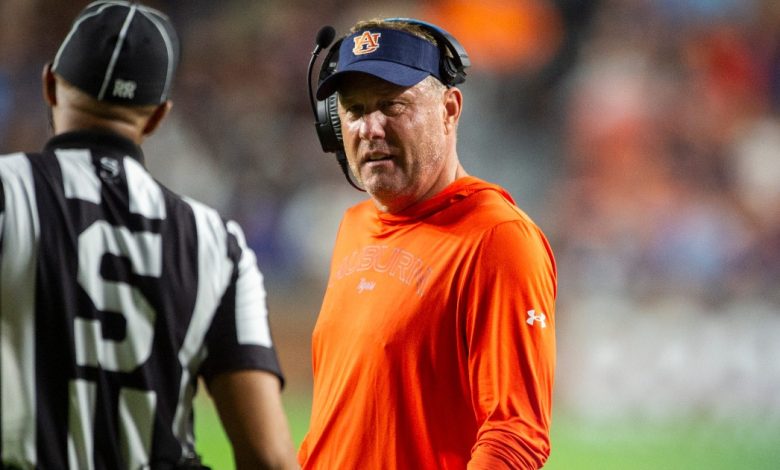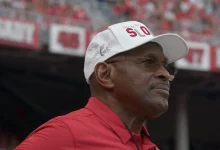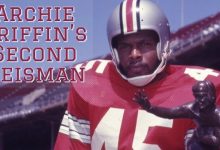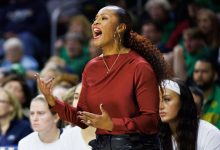Greg McElroy names Auburn a dark horse contender for the SEC Championship, citing improved coaching, strong recruiting, and potential breakout performances on both sides of the ball.

When former Alabama quarterback and ESPN college football analyst Greg McElroy names an Auburn team as a dark horse contender for the SEC Championship, people take notice. Not only is McElroy a respected voice in the college football world, but he also brings a unique perspective shaped by years of experience both on the field and behind the analyst desk. His assessment of Auburn isn’t just casual commentary — it’s a measured projection based on tangible improvements and promising potential.
So why does McElroy believe Auburn could shake up the Southeastern Conference in the upcoming season? The answer lies in a confluence of factors: upgraded coaching, recruiting momentum, a more favorable schedule, and a sense of renewed energy around the program under head coach Hugh Freeze.
The Hugh Freeze Factor: Culture Shift and Coaching Stability
Perhaps the most pivotal element in Auburn’s dark horse status is the presence of Hugh Freeze at the helm. In his first year leading the Tigers, Freeze faced an uphill battle: rebuilding the culture, reviving a stagnating offense, and navigating a fiercely competitive SEC West. The results were a mixed bag, but there were clear signs of progress.
Freeze, known for his offensive acumen and quarterback development, brings a proven track record from his days at Ole Miss and Liberty. At Ole Miss, Freeze orchestrated back-to-back victories over Nick Saban’s Alabama in 2014 and 2015 — a rare feat in the Saban era. That alone earns him credibility in the SEC coaching ranks.
What McElroy likely sees is the foundational shift Freeze has sparked. Auburn under Bryan Harsin struggled with internal dysfunction, inconsistency, and questionable recruiting. Freeze has re-energized the program by establishing a stronger identity, particularly on offense. His leadership has created buy-in from players and fans alike, which is crucial for any team looking to rise from the middle of the SEC pack.
Recruiting Wins and Roster Upgrades
McElroy also cited strong recruiting as one of the key reasons for Auburn’s potential breakout, and he’s right to do so. Auburn’s recent recruiting classes, particularly since Freeze’s arrival, have marked a significant improvement over prior years.
The Tigers secured a top-10 class nationally in the 2024 cycle, including several blue-chip prospects on both sides of the ball. Headlining the group are explosive offensive players like five-star wide receiver Cam Coleman and dynamic running back J’Marion Burnette. Defensively, the Tigers added depth and athleticism in the secondary and linebacker corps, areas that had lagged in talent during the past few seasons.
Equally important is Freeze’s use of the transfer portal. Auburn brought in experienced playmakers and plug-and-play starters, including quarterback Walker White, wide receiver Robert Lewis, and multiple offensive linemen who can help fortify a unit that’s been a major liability in recent years.
In today’s college football landscape, recruiting isn’t just about high school prospects — it’s about roster management. Auburn appears to have struck a balance between building for the future and addressing immediate needs, a factor that boosts their short-term competitiveness.
Quarterback Development and Offensive Identity
One of the biggest unknowns — and potential areas of transformation — is at quarterback. Auburn’s quarterback play has been erratic for the past few seasons, failing to provide the consistency needed to compete at a high level in the SEC. However, under Freeze, there’s hope that stability and growth at the position are within reach.
Holden Geriner, a former four-star recruit with a high ceiling, has been getting rave reviews this offseason. Additionally, Walker White, a top prospect, offers a promising future, even if he doesn’t start immediately. The Tigers also added Payton Thorne via transfer from Michigan State, and while his first year at Auburn was uneven, he’s a veteran presence who could benefit from a full offseason in Freeze’s system.
Freeze’s offensive philosophy emphasizes tempo, spacing, and quarterback-friendly reads. At Ole Miss, he produced top-15 offenses nationally, and there’s reason to believe he can recreate similar success at Auburn. McElroy likely sees the potential for offensive improvement — not just statistically, but in overall efficiency and execution — which could be the catalyst for turning tight games into wins.
Strength in the Trenches: A Rebuilt Offensive Line
It’s often said that games are won and lost in the trenches, and Auburn’s offensive line has been a sore spot in recent years. Under Freeze and new offensive line coach Jake Thornton, that may no longer be the case. Auburn hit the transfer portal aggressively to overhaul the unit, bringing in seasoned linemen from Group of Five programs and Power Five backups ready for starting roles.
Continuity and chemistry on the line are always concerns with so many new faces, but reports from spring practices and summer workouts suggest cohesion is coming together. If Auburn can protect the quarterback and open holes in the run game, the offense could become balanced and dangerous — the kind of unit that can compete with the SEC’s best.
Defensive Potential and Playmakers Emerging
While the offense garners much of the attention, Auburn’s defense has the potential to be one of the more underrated units in the conference. New defensive coordinator Ron Roberts is known for his aggressive, multiple-look schemes, and year two under his leadership could see a significant leap in production.
The defensive line features several young players who flashed promise last year, including Keldric Faulk and Jayson Jones. At linebacker, the return of veterans and the arrival of key recruits create a deep, athletic rotation. The secondary, led by experienced safeties and corners with SEC playing time, could be a strength.
What McElroy likely appreciates is that Auburn doesn’t need to field a top-5 defense to contend — it just needs to be opportunistic, force turnovers, and hold up in key moments. With improved depth and a more aggressive scheme, the Tigers could do exactly that.
A Manageable Schedule and Opportunity for Early Momentum
In the SEC, scheduling can make or break a season. Auburn’s 2025 schedule isn’t a cakewalk, but it’s more favorable than in recent years. The Tigers get several key games at home, including matchups against Texas A&M and Arkansas, while avoiding Georgia in the crossover for the first time in decades thanks to the SEC’s new scheduling format.
The season opener and early non-conference games provide chances to build confidence before heading into the meat of the SEC slate. If Auburn can enter October with a 4–1 or 5–0 record, they could carry that momentum into games that will define their season. And with the way college football seasons often unfold — upsets, injuries, and chaos included — being in the hunt late in the year is half the battle.
Auburn’s Mental Edge: Embracing the Underdog Role
Historically, Auburn has thrived when counted out. The 2004, 2010, and 2013 teams all began their seasons outside the national championship spotlight and ended up playing in major bowls — two of them competing for titles. McElroy, having played against Auburn and now covering the sport nationally, understands that the program often performs best with its back against the wall.
Hugh Freeze has embraced this underdog narrative, using it to motivate players and rally support. The culture shift, fueled by belief and confidence, is evident in player interviews, recruiting momentum, and fan enthusiasm. This intangible quality — mental toughness — could be what sets this Auburn team apart from recent underachievers.
From Dark Horse to Contender?
Greg McElroy’s endorsement of Auburn as a dark horse SEC contender isn’t mere headline fodder. It reflects a deeper understanding of where the program is headed under Hugh Freeze. With upgraded talent, a more favorable schedule, and a proven coaching staff, the Tigers are positioned to make noise in a league that’s often dominated by the usual suspects.
Of course, plenty of questions remain. Quarterback consistency, line play, and defensive execution will ultimately determine whether Auburn can transition from hopeful to legitimate. But in a conference known for surprises, Auburn may be perfectly positioned to capitalize — and McElroy just might be ahead of the curve in recognizing it









